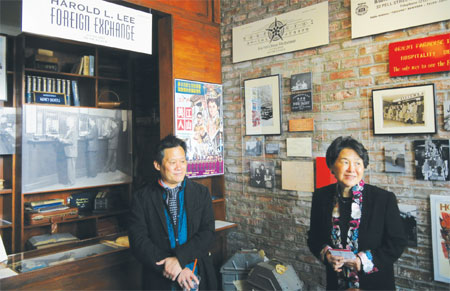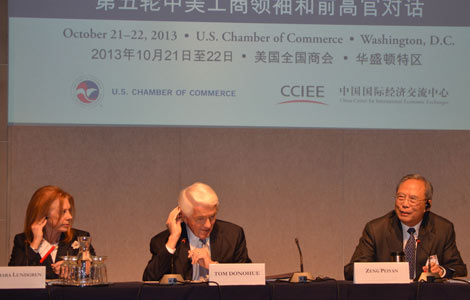Chinatown through one family
Updated: 2013-10-25 11:13
By Kelly Chung Dawson in New York (China Daily USA)
|
||||||||
|
Doug Lee and Sandra Lee, two descendants of a family that has been deeply involved in New York's Chinatown for 125 years, stand in front of a display at the Museum of Chinese in America's new exhibition "The Lee Family of New York Chinatown Since 1888." Kelly Chung Dawson / China Daily |
Since 1888, the Lee family has worked and lived at 31 Pell Street in New York's Chinatown, alternately operating a grocery and curio shop, currency exchange, film company, travel agency and insurance brokerage. Their history is now on display at the Museum of Chinese in America (MOCA) in an exhibition that showcases a family that flourished at a time when discrimination was the norm, rising in influence through business acumen and an ongoing civil engagement with the Chinese immigrant community of New York City.
Running through April 2014, The Lee Family of New York Chinatown Since 1888 presents an assortment of authentic artifacts and photographs in a facsimile space approximating a Chinese general store, the onetime heart and hub of Chinatowns across America.
"Longevity is an important thing in the Chinese community, and 125 years is an incredible accomplishment," said Doug Lee, grandson of Harold L. Lee, the founder and patriarch of the modern day Lees of Chinatown. "I'm incredibly proud that we've been able to keep it going, and that our family remains together. Since we started researching our history, I have been awestruck and humbled by how entrepreneurial our forefathers were."
Harold was the son of Lee On, who joined his brothers in Chinatown after they founded Tai Lung ("Great Prosperity") on Pell Street. All three likely worked on the US railroad, possibly alongside another Lee relative who, according to family accounts, was adopted by a Native American tribe after an attack on American railroad laborers.
Today both Harold Lee and Sons Insurance and Lee Travel remain successful, representing banks, large corporations and nonprofits. Sandra Lee Kawano, CEO of the insurance company, attributes the family's success to the sense of social responsibility that has always defined the Lee legacy.
During the early days, the second floor of 31 Pell Street included a desk for each business, as family members worked side by side in a venue the community came to view as more than a place of business. Immigrants trusted the Lees to send money back to their villages in China, and knew that if they were short of cash a personal item might be pawned to feed their families at home. Families whose older relatives had trouble communicating with their youngest came to the Lees for help in convincing their offspring to make wise decisions regarding money and life, Sandra recounted. Educating immigrants on the value of purchasing insurance or depositing money in a bank - concepts that were entirely foreign in the Chinese community - was difficult but important, she said.
Chinese were often viewed with suspicion outside their communities in those years, and the function of family and community was largely one of protection. Providing goods and services to the Chinese of New York gave the family prominence and eventually wealth. Still, the Lees were not always immune to the difficulties of discrimination.
In 1899, Doug's great-grandfather, Lee On, was stopped at the US border upon his return from a business trip to China by way of Canada. Immigration officials refused to believe that a Chinese man could be a successful merchant, despite his official citizenship papers, US birth records and repeated protestations. He was taken to Burlington, Vermont, where immigration officials detained him in service of a Chinese Laundromat. He was later cleared and discharged.
"Our family's early success had a lot to do with the drive that got them out of China to begin with," Doug said. "It was a tough time, and with maybe 1,000 Chinese in a city of 1.5 million, there weren't many like-minded people around. That was why family was so important. You could trust family, and that continues to this day."
The experience of discrimination and exclusion also motivated the Lees to buy a movie theater to screen Chinese films. Later, Harold founded the New York Film Exchange, distributing Chinese-language films for production companies including the Great Wall Film Company of Shanghai, founded by Harold's uncle, Lee Kee Do. That studio's goal was to produce films that accurately and sensitively presented the lives of everyday Chinese people, in storylines that ran counter to the Hollywood stereotypes of opium dens, brothels and distressed damsels with bound feet.
Also on display is a rare kinescope of Let's Take a Trip, a live CBS TV broadcast from 1956, in which host Sonny Fox and two young friends visit the Lee family during Chinese New Year. Through scenes that presented Chinese customs and food and various members of the Lee family (including Sandra and Doug's father), America got a glimpse of what life was like for Chinese people in the 1950s.
For CEO Sandra, whose grandmother's only contact with other women was on the back fire escapes behind Pell Street because the Chinese community at the time largely operated as a "Bachelor Society", the women of the family have been equally inspiring. Sandy has twice been named to Crain's prestigious list of 100 most influential and powerful business leaders in New York.
The artifacts on display at MOCA will soon permanently enter the National Archives, a document of one family's contributions to an ever-changing community.
"In Chinatowns there's an unwritten idea of a duty to protect our neighborhood and its history, even when people move out and transition happens," MOCA curator and director of exhibitions Herb Tam said. "That sense of continuity is an important part of life in Chinatown, and to see that history through one family is unusual and unexpected."
kdawson@chinadailyusa.com
(China Daily USA 10/25/2013 page11)

 Giant duck to exit after drawing the crowds
Giant duck to exit after drawing the crowds
 Miss Universe 2013 to be held in Moscow
Miss Universe 2013 to be held in Moscow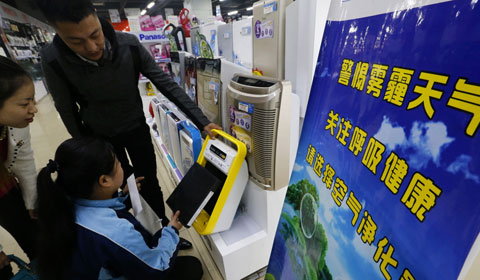
 Ministry to begin inspecting most heavily polluted regions
Ministry to begin inspecting most heavily polluted regions
 Spy claims stir rebuke to Obama
Spy claims stir rebuke to Obama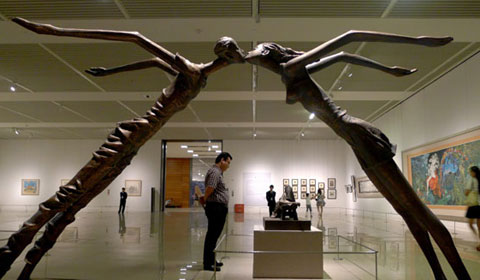
 Paint the world a picture
Paint the world a picture
 World's first 1-liter car debuts in Beijing
World's first 1-liter car debuts in Beijing
 Latin American clown convention
Latin American clown convention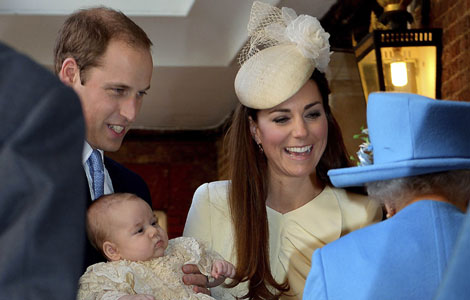
 Prince George baptized in London
Prince George baptized in London
Most Viewed
Editor's Picks

|

|

|

|

|

|
Today's Top News
US, China broadband companies join forces
Chinatown restaurants learn how to get an 'A'
Snuff bottle 'gems' on display at Met
Beijing airport set to become world's busiest
US firms urge easier process for investment
Spy claims stir rebuke to Obama
China calls for strengthened EU ties
US will host int'l investment summit
US Weekly

|

|
